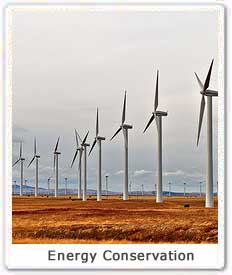 Source
of Energy Conservation :
Source
of Energy Conservation : Solar Energy : Solar power uses the sun's energy and light to provide heat, light, and electricity for homes. It is the primary source of all energy forms on the earth. It is one such energy which helps in maintaining the ecological balance through the process of photosynthesis and green house effect. We have been using sun to dry clothes and boil food for generations. But now number of techno powers which have been developed to make full use of solar energy such as : -
Photovoltaic systems : By these systems the electricity could be produced directly from the sunlight.
Solar Process Space heating and cooling : It is the commercial and industrial use of sun's heat.
Solar Hot Water : The process to heat water with the solar energy.
Solar Power plants : Producing electricity bu using the sun's heat.
Passive Solar heating and daylighting : Use solar energy to heat buildings.
Wind energy :
Wind energy is often used to generate the mechanical power or the electricity. In the country like India, wind energy holds the great importance because of large hilly, coastal and desert areas. In the rural areas it is used to pump water and grind grain. The benefit of wind energy is that it is fully pollution free and is eco friendly too. It costs low and the generation of power is continuous. It is the most effective way to conserve the energy and prevent the environment.
Geothermal Energy : Geothermal energy is used in the form of thermal energy, electrical energy, nuclear energy, mechanical energy, chemical energy and light energy. It uses heat energy from beneath the surface of the earth. It was first used to produce electricity in the Itlay in 1903. Geothermal energy has the major environment benefit as it prevents air pollution. It is particularly important in the inland nations such as Indian Oceans and the pacific regions. Energy generation from geothermal sources is only possible in few places under unique geographic conditions.
Wave energy :
Ocean waves contain large amount of energy, which can be extracted through Ocean winds, Ocean currents, Ocean Geothermal etc. if the barrage is built across the river, electricity can be obtained by by the flow of water through turbines as the tide rise and falls.
Hydroelectric energy :
Another renewable source of energy is the hydroelectric energy, which is produced from fast flowing water. The process is pollution free. The movement of water spins the turbines which in turn generate electricity.
Biomass energy :
Biomass is the plant and animal waste which is used as the energy. Biomass energy like manure from livestock, plant waste etc can be used to generate electricity, fuel, light, and heat. We get biomass energy directly from plants and indirectly from the animal waste.






